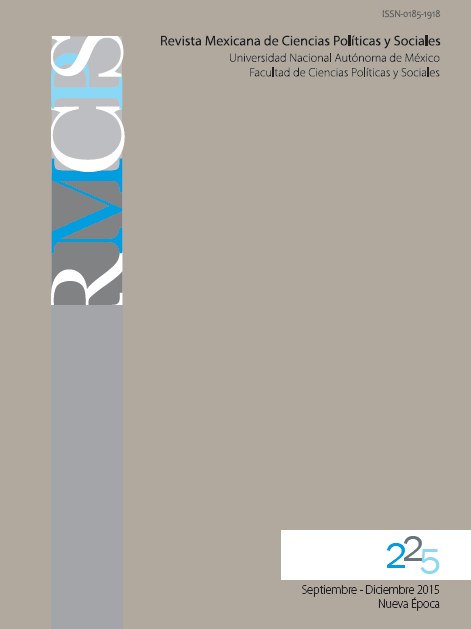Heterology The (Impossible) Science of Violent Residues
Main Article Content
Abstract
This paper seeks to show that in the work of Bataille there is a general social theory articulated around the notion of the sacred. According to our reading hypothesis, Bataille deepened and extended the movement initiated by Durkheim, who postulated the syntax of the sacred archaic as the most fundamental part of the social grammar. But he did so interpreting the Durkheimnian legacy in the light of a conception of multitude understood as general economy of collective passion. To do this, he borrowed from psychoanalysis and German phenomenology, producing an original theory of the social bond, the structure and dynamics of human groups, with which he proceeded to analyze the discontents of his time. Given the tragic anthropology that framed this intellectual enterprise, the result was the impossible or transgressed social theory that takes the name of heterology.
Downloads
Article Details
Citas en Dimensions Service
References
Adorno, Theodor, Horkheimer, Max, (1998) Dialéctica de la Ilustración. Fragmentos filosóficos. Madrid, Trotta.
Arendt, Hannah, (1967) Eichmann en Jerusalén. Un estudio sobre la banalidad del mal. Barcelona, Lumen.
Bataille, Georges, (1967) La Part Maudite. París Seuil.
Bataille, Georges, (1974) Obras escogidas. Barcelona, Barral.
Bataille, Georges, (1976a) “La notion de dépense” en Œuvres Complètes, tomo II. París, Gallimard.
Bataille, Georges, (1976b) “La structure psicologique du fascisme” en Œuvres Complètes, tomo II. París, Gallimard.
Bataille, Georges, (1979) Sobre Nietzsche. Voluntad de suerte. Madrid, Taurus.
Bataille, Georges, (1996) “Le sens morale de la sociologie” en Critique. Vol. 591, núm. 2, agosto-septiembre, pp. 159-165.
Benveniste, Émile, (1969) Le vocabulaire des institutions Indo-européennes. París, Minuit.
Bretón, André, (1969) Manifiestos del surrealismo. Madrid, Guadarrama.
Castaño Zapata, Daniel y Natalia Clelia Suniga, (2014) “Fiesta y sacrificio. Explorando el problema de la transgresión en Georges Bataille” en Revista Mexicana de Ciencias Políticas y Sociales. Año LIX, número 222, septiembre-diciembre, pp. 235-256. México, Facultad de Ciencias Políticas y Sociales, UNAM.
Caillois, Roger, (1949) El hombre y lo sagrado. México, Fondo de Cultura Económica.
Derrida, Jacques, (1989) La escritura y la diferencia. Barcelona, Anthropos.
Durkheim, Émile, (1993) Las formas elementales de la vida religiosa. Madrid, Alianza.
Dunan, Noelia Denise y José Taurel Xifra, (2015) “Bajo materialismo y surrealismo. El debate Bataille-Breton” en Revista Mexicana de Ciencias Políticas y Sociales. Año LX, núm. 223, enero-abril, pp. 171-190. México, Facultad de Ciencias Políticas y Sociales, UNAM.
Freud, Sigmund, (1995) “Más allá del principio de placer” en Obras completas. Vol. XVIII. Buenos Aires, Amorrortu.
Habermas, Jürgen, (2008) El discurso filosófico de la modernidad. Buenos Aires, Katz.
Hertz, Robert, (1990) La preeminencia de la mano derecha: estudio sobre la polaridad religiosa. México, Alianza.
Lévi-Strauss, Claude, (1956) “Sociología francesa” en Gurtvich, Georges y Wilbert Moore (eds.), Sociología en el siglo XX. Barcelona, Ateneo.
Monnerot, Jules, (1946) Les faits sociaux ne sont pas des choses. París, Gallimard.
Monnerot, Jules, (1969) Sociologie de la Révolution. París, Fayard.
Otto, Rudolph, (1956) Lo santo. Madrid, Revista de Occidente.
Roudinesco, Elisabeth, (1993) Jacques Lacan. Esquisse d’une vie, histoire d’un systèm d’ pensée. París, Fayard.
Sasso, Robert, (1978) Georges Bataille. Le système du non-savoir. París, Éditions de Minuit.
Schmitt, Carl, (1998) Teología política. Cuatro ensayos sobre la soberanía. Buenos Aires, Struhart.
Surya, Michel, (1987) Georges Bataille: La mort á l’œuvre. París, Séguier.
Tonkonoff, Sergio, (2013) “The Dark Glory of Criminals: Notes on the Iconic Imagination of the Multitudes” en Law and Critique. Vol. 24, Issue 2, pp. 153-167.

La Revista Mexicana de Ciencias Políticas y Sociales publicada por la Universidad Nacional Autónoma de México se distribuye bajo una Licencia Creative Commons Atribución-NoComercial-SinDerivar 4.0 Internacional.
Basada en una obra en http://www.revistas.unam.mx/index.php/rmcpys/
La RMCPyS autoriza a sus colaboradores que suban una copia de sus trabajos publicados en sus webs personales o en cualquier repositorio de acceso abierto, siempre y cuando se mencione específicamente a la Revista Mexicana de Ciencias Políticas y Sociales como fuente original de procedencia, citando el año y número del ejemplar respectivo y añadiendo el enlace a la página web donde este órgano editorial puede ser consultado in toto, de manera abierta y gratuita en: <www.revistas.unam.mx/index.php/rmcpys>.
Las y los lectores tienen libertad para:
Compartir, copiar y redistribuir el material en cualquier medio o formato.
El licenciante no puede revocar estas libertades en tanto usted siga los términos de la licencia.
De acuerdo con los siguientes términos:
- Atribución: la/el lector/a debe reconocer el crédito de una obra de manera adecuada, proporcionar un enlace a la licencia, e indicar si se han realizado cambios. Puede hacerlo en cualquier forma razonable, pero no de forma tal que sugiera que tiene el apoyo del licenciante o lo recibe por el uso que hace.
- No comercial: la/el lector/a no puede hacer uso del material con fines comerciales.
- Si se mezcla, transforma o se desarrolla a partir de la obra licenciada, no se permite la distribución del material modificado.
Cargos por gestión de artículos
La Revista Mexicana de Ciencias Políticas y Sociales NO cobra tarifas por recibir, procesar o publicar los artículos (Article Processing Charge [APC]) enviados por los autores.





